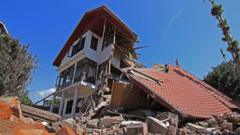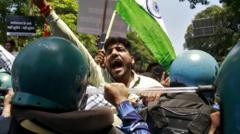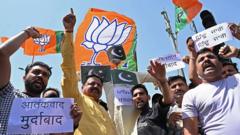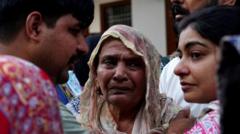The tragic incident in Kashmir marks a pivotal moment in India-Pakistan relations over the disputed territory, as both nations brace for potential escalations.
# Rising Tensions in Kashmir: India Blames Pakistan for Recent Attack

# Rising Tensions in Kashmir: India Blames Pakistan for Recent Attack
India officially denounces Pakistan's involvement following a deadly assault on tourists in Kashmir, exacerbating regional tensions.
In a grave escalation of hostilities, India is accusing Pakistan of supporting terrorism after a brutal attack that took the lives of 26 individuals, primarily tourists, in the Indian-administered region of Kashmir. The Indian government has labeled the event a severe terrorist act and has pointed towards “cross-border linkages” implicating Pakistan.
The attack was claimed by a group known as the Resistance Front, which surfaced on social media to take responsibility. Officials from India privately assert that this group functions as a proxy for Lashkar-e-Taiba, a notorious militant organization rooted in Pakistan. However, India has been limited in the public evidence it has shared tying Pakistan to the attack. Pakistan has firmly denied any involvement, insisting that Lashkar-e-Taiba is largely inactive and has called for an international investigation into the tragedy.
In light of this event, speculation is mounting regarding India's potential military response, with some officials suggesting a retaliatory strike against Pakistan is under consideration. India has cited what it describes as a historic pattern of Pakistan's support for militant forces that target Indian interests.
As this situation unfolds, it’s essential to understand the historical context behind the Kashmir conflict. Originating from the tumultuous partition of British India in 1947, the dispute has persisted across decades, fostering an environment of mistrust and violence between the two neighboring countries.
The international community watches closely as the situation develops, with ongoing calls for de-escalation and dialogue to prevent further bloodshed in the region.




















